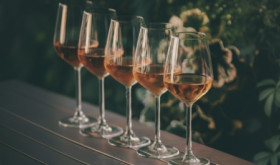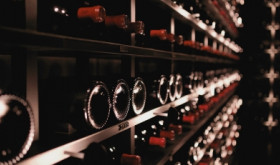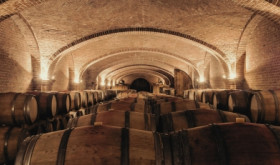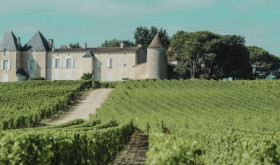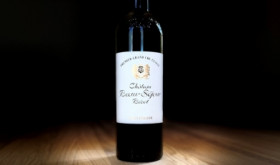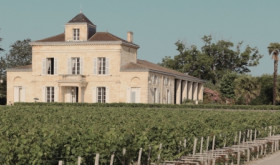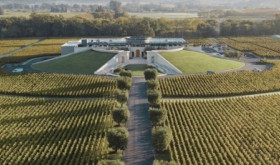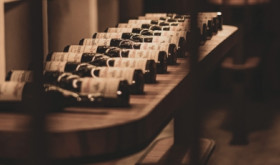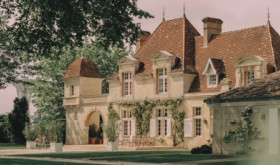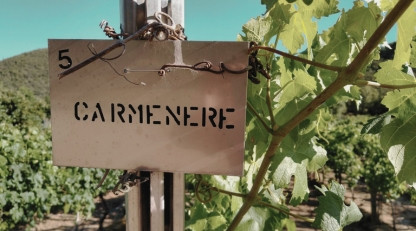
WineCap spoke with leading Bordeaux estates on the much-discussed possibility of introducing new, heat-resistant grape varietals to this leading wine region to mitigate the impact of global warming.
-
- Adaptive viticulture and winemaking were the prevalent answers to coping with climate change.
- The minority considered old resilient Bordeaux varietals and new grapes.
- Heritage and current appellation laws are significant.
Adaptive winemaking: Château Pichon-Baron
Christian Seely, managing director of AXA Millésimes, owner of Château Pichon-Baron was firm that the response to climate change was not the introduction of new cultivars but rather adaptive winemaking.
‘Here at Pichon, 25 years ago, the blend tended to be around 65% Cabernet Sauvignon, 35% Merlot. These days, it’s 80% or more Cabernet Sauvignon and 20% Merlot,’ he told WineCap. ‘It’s not an answer to climate change, but it’s how we’re adapting because we are having more hot, sunny years which enable us to get the Cabernets magnificently ripe. In the old days, when we hadn’t got the Cabernets perfectly ripe, a nice bit of ripe Merlot was a useful element in the blend. It’s still a useful element, but we need less of it.’
This approach also softens the grape alcohol content that has steadily risen along with warmer growing seasons. ‘Merlot grapes here will probably have one degree more of alcohol than Cabernet. If you want to keep your wines under 14% abv, which we do at Pichon, one way of doing that is to increase the proportion of Cabernet Sauvignon.’
Traditional vineyard management and quality over trend: Château Canon-la-Gaffelière and Château Calon Segur
Stéphane von Neipperg, proprietor of Château Canon-la-Gaffelière, was uncompromising on his views about new varieties, preferring skilled, traditional viticulture instead.
‘Increasingly, some technical people are speaking about new varieties for wines. I’m just against it,’ he told WineCap. ‘They’re not proving that the quality is outstanding. They only prove that they don’t need to spray against mildew.’
Von Neipperg stressed the château’s effective practice of copper spraying which complements the composition of its vineyard soils and its cultivation of old vines that display hardiness to warmer summers.
‘We are well known for old vines. We have our own genetics and I think this is much more important than these new varieties.’
Vincent Millet, general manager of Château Calon Ségur has a similar approach to dealing with rising temperatures: massal selection and a decades-long vineyard restructuring plan to be completed in 2035.
‘We recovered old Merlot vines from 1940, Petit Verdot from the 1930s, and Cabernet Franc from the 1970s. We have created our own collection,’ he told WineCap. ‘This collection allows us to preserve a genetic heritage…which allows us to try to resist the increases in temperature.’
Under this climate change-defying scheme, rather than planting new cultivars, the château plans to plant more Cabernet Sauvignon and adjust the quantities of the other traditional Bordeaux varietals.
Potential of resilient Bordeaux varieties: Château Saint Pierre and Château Beychevelle
For co-owner of Château Saint Pierre, Jean Triaud, there is the possibility of regional heat-tolerant grape varieties thriving in warmer climates, making a comeback. He cited Malbec, a varietal that originated and still grows in southwest France and now flourishes in Argentina and Carménère, formerly planted widely in the Médoc and now the flagship black grape of Chile.
‘Those great varieties come from Bordeaux, but finally work much better in other places thanks to the weather. Why not come back?’
However, referring to appellation laws, he acknowledged that the situation was complex. ‘But it’s not so easy because here we don’t decide all the rules,’ he added.
While acknowledging the strict limitations of the appellation system, Philippe Blanc of Château Beychevelle had a similar perspective.
‘The most sensible thing would be to take varieties coming from the south, mainly Spain and Portugal, and see how they adapt here,’ he told WineCap. ‘It’s always this way. You go north and plant Pinot Noir in Sweden or Brittany or Chardonnay in Kent. Maybe it’s good to invest in Brittany or Normandy to make new vineyards in the future.’
Restrictive appellation laws: Château Beychevelle
General manager of Château Beychevelle, Philippe Blanc, is open to the possibility of introducing new heat-resistant grape varieties but recognises that the French appellation system is slow to react and evolve.
‘It takes a lot of time to reach an agreement. If I decide to plant Shiraz, I can make Vin de France, but I can’t make Saint-Julien. So, in terms of value, it’s difficult to do,’ he said. ‘I’ve got no new varieties but, we’ll keep an eye on this and as soon as we’re allowed to plant new grapes, even 2% or 3%, we’ll do it.’
Value of regional heritage and legacy: Château Margaux and Château Troplong Montot
Philippe Bascaules, managing director of Château Margaux said that the estate has the possibility of cultivar changes in mind and a designated block of vineyard for experimentation with new varietals. However, he told WineCap, ‘it’s not decided’.
‘Cabernet Sauvignon is the core of the blend of Château Margaux. The decision to change that is a big one. I’m not considering doing it in the next 50 years.’
Commercial director of Château Troplong Montot, Ferréol du Fou, was more direct about the option to use heat-resistant grapes as a buffer against climate change.
‘Burgundy has Pinot Noir. Bordeaux has Merlot, Cabernet Franc, Cabernet Sauvignon, and Petit Verdot. The solution is to work more in the vineyard, it’s not planting Tempranillo. It’s a plaster, it’s a bandage. We have to think about the next generation,’ he told WineCap. ‘Making Tempranillo in Bordeaux is stupid. I’m a bit harsh, but this is the truth for me.’
See also our Bordeaux I Regional Report.
WineCap’s independent market analysis showcases the value of portfolio diversification and the stability offered by investing in wine. Speak to one of our wine investment experts and start building your portfolio. Schedule your free consultation today.
